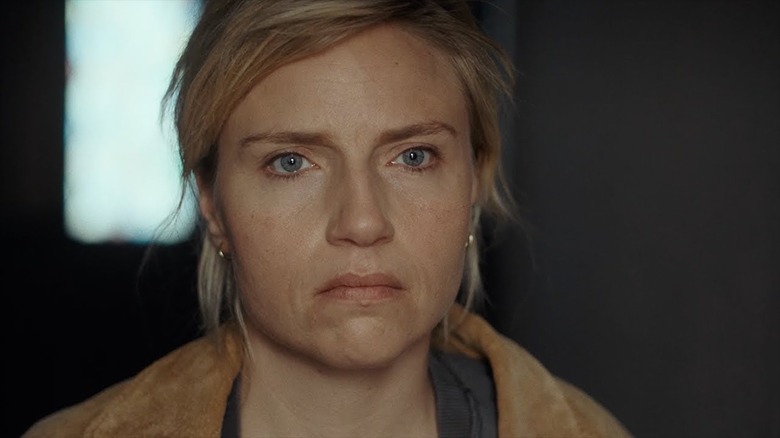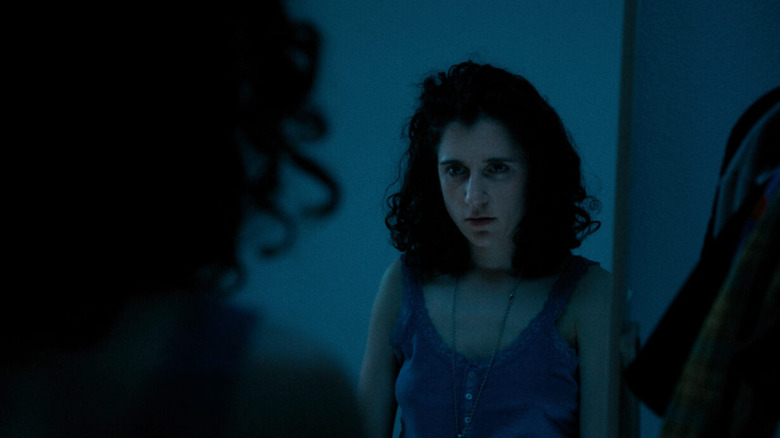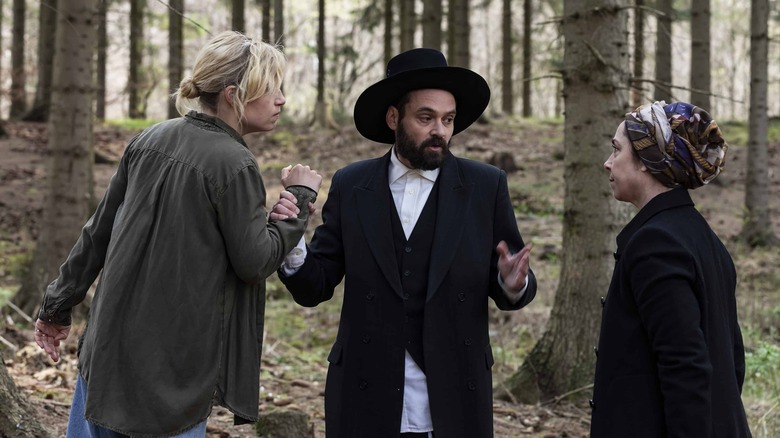Attachment Review: Mothers, Monsters, And Moral Conundrums
- An emotionally complex story
- Good Jewish and queer representation
- Relies a bit on coincidences
- Could have been scarier
Forget the "Die Hard" debate — is "Attachment" a Christmas movie? The debut feature of writer-director Gabriel Bier Gislason (son of "Bird Box" director Susanne Bier) is being released on Shudder in February, but the film's story starts in December in the midst of Denmark's holiday season. Maja (Josephine Park), an unsuccessful actress whose one big TV role was playing one of Santa's elves, is working at a library, donning her elf hat to read Christmas stories to children. It's at this library she has her big meet-cute with Leah (Ellie Kendrick, who played Meera Reed in "Game of Thrones"), an academic visiting from the United Kingdom. After hitting it off instantly, the two accidentally mix up their books, leaving Maja to improvise a story for the kids while holding a volume on Jewish art.
So there's one point against the "Christmas movie" argument: "Attachment" is a very Jewish movie. Leah comes from an Orthodox family, and the central horror of the film is presented through a lens of Jewish folklore and is thematically based around particularly Jewish cultural concerns. On the other hand, who says a "Christmas movie" can't also be Jewish? After all, going to the movies on Christmas has become a popular Jewish tradition! Though as a romance, maybe its February release is more fitting for Valentine's Day...
Regardless of whatever season one chooses to watch it in, "Attachment" offers a distinctive take on the well-worn tropes of the possession horror sub-genre. Though neither the flashiest nor the scariest horror movie, its morally and emotionally complex character relationships and resonant themes prove subtly unnerving and offer a lot to think about.
Returning home
Maja and Leah fall in love quickly after they meet, with the latter temporarily moving into the former's place. The film's opening features a few cute scenes of them together with Maja helping Leah use pop music to improve her Danish language skills — the film's Danish title "Natten har øjne" ("The Night Has Eyes") comes from the lyrics to one of these songs. These happy times together, however, are interrupted by the story's big inciting incident: After ignoring a call from her mother Chana (Sofia Gråbøl), Leah has a seizure. Needing to recover, the couple's moving plans reverse, with Leah returning home to live with her mom in the United Kingdom and Maja following along to join her.
Chana originally came from a secular Jewish background, but after marrying an Orthodox man, she took up frum observance. Her husband and Leah's father is now dead, but Chana has stayed a part of his community — and has been partaking in kabbalistic rituals for mysterious purposes. Chana will insist all her rituals are for the purposes of protection, but through her own investigations and meetings with Lev (David Dencik), a religious bookstore owner and secret magic expert who serves to educate Maja on Jewish culture, Maja grows increasingly suspicious that Chana might not have her daughter's best interests in mind.
Somewhat surprisingly, but refreshingly, the main conflict doesn't have to do with Leah and Maja's queerness. It's not something Leah and Chana talk openly about with each other, but any potential homophobia on Chana's part is merely subtextual, and pretty minor subtext compared to the broader concerns about her desire to control her daughter's life. Lev says he "could be" or maybe even "should be" bothered by Leah and Maja's relationship, but he simply isn't. "Attachment" doesn't whitewash Orthodox Jewish communities into bastions of acceptance, but it doesn't demonize the people living in these communities as purely bigoted either, creating a nuanced depiction of living within the intersectional identities of Judaism and queerness.
Who, if anyone, is in the right?
To get too deep into the horror elements of "Attachment" runs the risk of spoilers. To put things broadly without going into too much detail, the main supernatural entity of concern is a dybbuk — the soul of a dead person that attaches itself to the living until either reasoned with or exorcised, and according to Lev, is decidedly "not a ghost" for reasons he can never quite explain clearly to Maja. The details of how this particular dybbuk operates are best left unspoiled, but I can say that its potential presence forces some truly tough choices for all of the characters.
Possession horror plays off religious anxieties, asking viewers how they would feel if beliefs that even most religious people have grown skeptical about were proven to be true. Typically the genre does this in a Christian context. "Attachment" handles these questions in a Jewish one, and in ways designed to provoke serious debate. It's not just asking "What if the dybbuk was real?" — it's asking "If the dybbuk was real, just what exactly would be justified in the name of fighting it?" It's both an interesting thought experiment and a layered metaphor for strained familial relationships. Every character in this story has their reasons for what they're doing and why, but that doesn't change the fact that actions done with the best of intentions may end up doing harm in ways that were never intended.
Telling a story centered around a limited cast of characters spread out across two different countries, "Attachment" does at times go a bit far in providing convenient excuses for where and how these characters' lives connect. The coincidences are most prominent in the film's final act, but they're ultimately excusable as a means of setting up the effectively chilling climax. Another minor quibble that's worth noting: The English subtitles that play across the entirety of this trilingual film don't always accurately convey all of the English dialogue (I can't speak to the completeness or accuracy of the translations for the Danish and Yiddish dialogue). All of these quibbles aside, "Attachment" will please those interested in a queer Jewish horror movie. Those who relate to its concerns about tradition vs. independence will find elements of its horror sticking with them.
"Attachment" premieres on Shudder on February 9.


